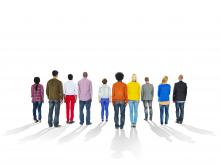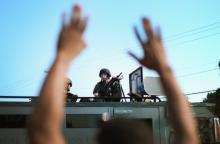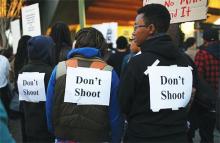Michael Brown

Last year I spoke at a missional church conference in Southern California. The guy who spoke before me asked every one of these missional pastors do a simple exercise.
“Turn to the person sitting next to you,” he said, “and tell them the names of your neighbors on every side of your house (or apartment) and share one story about their lives.”
The room went abuzz.
After a few minutes the speaker called the audience back and asked: “How many of you could share the names and stories of each of your neighbors on every side of your house?” No one raised their hands.
The speaker asked how many could share the names and stories of a few of their neighbors. Only about three people in an audience of about 200 raised their hands. This was a missional conference.

A study came out recently saying that millennials (a category that I apparently fit into) consider ourselves the “post-racial” generation. By and large, young adults think they are the ones who have moved past racism.
Except, that’s not true. Racism is alive and well.
Here at Sojourners I’m privileged to be a part of enlightening conversations about diversity, racism, sexism, and a whole host of other injustices. This makes it all the more frustrating when I try and continue those conversations outside the Sojourners community, and I’m met with resistance. Most of my friends are extremely uncomfortable discussing race. And not just because it’s a taboo subject; this is D.C., after all, and politics are always fair game in friendly discussion. Instead, I’ve found that my friends are so unsettled by the subject that they either try and change it, or they tell me it’s not about race, it’s about income inequality. Those arguments, which I follow up with “where do you think the income inequality came from?,” are still met with resistance, and arguments that if we could just bring people out of poverty, the racial disparities would vanish.
Except they wouldn’t.

Over the past three weeks there have been four separate incidents that have led to the deaths of four unarmed black men at the hands of police. For many black people, myself included, the moments following these tragic events are filled with despair, sorrow, anger, and frustration. Each incident serves as a reminder that as a black man in America, my life holds little to no value in the eyes of the general public. To be young and black in the United States means to live under constant pressure, something most non-black American citizens know nothing about.
For the majority of black people, the police do not represent protection or safety, rather they are a menacing force that terrorize those they are supposed to serve. I have never felt safe in the presence of law enforcement. In fact, whenever police are in close proximity to me, I feel in danger. Whenever a cop drives behind me or beside me I feel anxious, not protected.
Is my paranoia justified?

How do you talk about joy in times like these and not sound like a traveling salesman with a bottle of snake oil up his sleeve?
Recently, I received word that Robert Gittelson, the cofounder of Conservatives for Comprehensive Immigration Reform, had died suddenly from a massive heart attack. Over the next seven days, the prolific 63-year-old comedian and actor, Robin Williams, committed suicide, and revered screen legend, Lauren Bacall, passed away at the age of 89.
In response to the death of Michael Brown, many people are using the hastag #IfTheyGunnedMeDown on Twitter to consider the role that images used by the media have on the public's perception of vicitms.
Which picture would the media use #iftheygunnedmedown the left or the right? pic.twitter.com/BXGjJFvRco
— Adam SLANDER (@mr_mookie) August 10, 2014
Here's more according to the Washington Post:
The concern is how media will portray a dead child’s life after he’s slain by police officers. This is the stuff of#IfTheyGunnedMeDown, a Twitter hashtag that trended Sunday as part of the conversation surrounding the death of Michael Brown. Brown, 18, was an unarmed black teenager slain in Ferguson, Mo. He’d recently graduated high school. Black users shared pictures of themselves at their best — in uniforms or caps and gowns — juxtaposed with images that would garner less sympathy and perhaps paint more tawdry pictures of their lives.

AFRICAN AMERICANS around the country are finding it is dangerous to call 911. Jack Lamar Roberson’s family in Waycross, Ga., discovered this the hard way when they placed an urgent call to 911 in October 2013 because his fiancée thought that he had taken an overdose of diabetes medicine.
Instead of sending EMTs, the dispatcher sent the police. Within 20 seconds of being in the house, police shot Roberson nine times, with bullets striking his back, arms, chest, and head as he held his arms up in the air. Although he was a veteran, he did not die from bullet wounds at the hands of strangers in a foreign land. Instead, white police gunned him down in his home.
Killings like this—which could be called anti-black hate crimes by police—are far too common. “Operation Ghetto Storm,” a 2012 report by the Malcolm X Grassroots Project, revealed that white police officers, security guards, or vigilantes kill an unarmed black man, woman, or child every 28 hours in the U.S. In 2012, police officers shot 57 people in Chicago—50 were black, two were white. Miami police officers killed seven black men within eight months in 2011. The Houston-based African-American News & Issues headlined an article this spring: “Open Season on Blacks in Texas: Cops Are Shooting First & Not Asking Questions.”
These police killings of black people emerge out of a culture and system of white supremacy. In such a context, police killing of black people is not a black problem. It is an American problem that shreds the curtains of democracy.